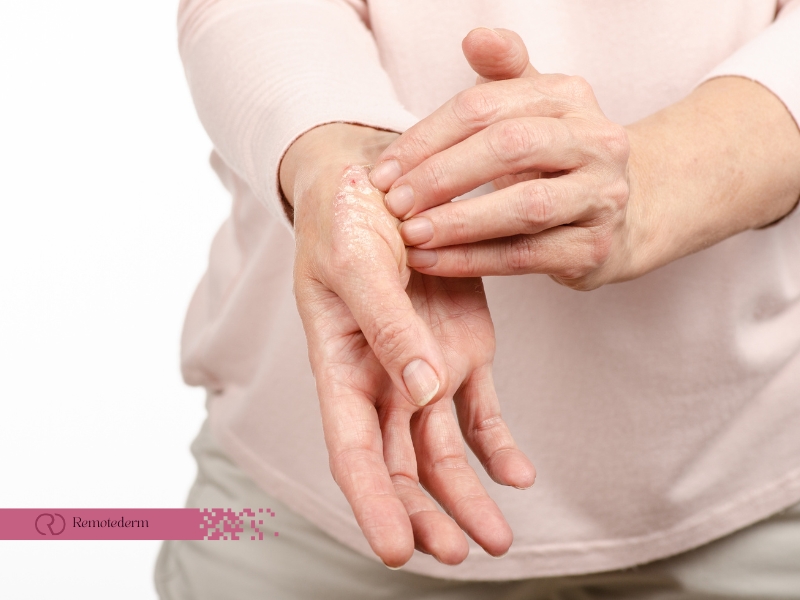Psoriasis is a chronic skin disease that affects millions of people all over the world. While it can be managed with the help of dermatology professionals, many individuals seek effective ways to treat psoriasis at home. In this comprehensive guide, we will delve into 10 methods that can help you effectively manage and alleviate psoriasis symptoms without leaving the comfort of your home. So, let’s unlock the secrets to treating psoriasis at home.
Understanding Psoriasis
Before diving into methods of treating psoriasis at home, it’s essential to grasp the basics of this skin condition. Psoriasis is a skin disease marked by red, scaly patches on the skin’s surface. It stems from an overactive immune system, causing rapid skin cell growth.
In a normal skin cycle, cells take about a month to mature and shed. In psoriasis, this process accelerates to just a few days, leading to an accumulation of cells on the skin’s surface, forming plaques.

Psoriasis isn’t just a physical concern; it can also affect emotional well-being. While there’s no permanent cure, it can be managed, you can further explore 10 effective home-based methods to help you control psoriasis and improve your quality of life.
How To Treat Psoriasis At Home?
Now that we’ve established a basic grasp of psoriasis, let’s look at the various successful approaches that can help you manage and treat this skin condition from the comfort of your own home. Psoriasis, with its characteristic red and scaly patches, can be difficult to live with, but it can be efficiently managed with the correct tactics.
- Maintain Proper Hydration
Proper hydration is critical in treating psoriasis symptoms. Drinking plenty of water hydrates your skin from the inside out. Hydrated skin is less prone to irritation and dryness, which can aggravate psoriasis. To keep your skin soft, drink at least eight glasses of water every day.
- Choose a Psoriasis-Friendly Diet
Your diet can significantly impact psoriasis. Incorporate foods rich in anti-inflammatory properties, such as fruits, vegetables, and fatty fish. Omega-3 fatty acids found in fish like salmon can help reduce inflammation associated with psoriasis. Conversely, avoid trigger foods like processed snacks and alcohol, as they can worsen symptoms.
- Regular Application of Moisturizers
Moisturizing is an indispensable cornerstone in the management of psoriasis. The key lies not only in consistent moisturization but also in the careful selection of the right products. Opt for fragrance-free and hypoallergenic moisturizers to create a protective barrier that shields your skin from dryness and itching. The ideal moment to apply moisturizer is immediately after bathing when your skin is slightly damp. This post-shower ritual effectively seals in the moisture, promoting skin hydration and comfort. Embracing this practice can significantly diminish the discomfort associated with psoriasis, making it an essential component of your daily skincare routine.

- Warm Baths with Epsom Salt
Indulging in a soothing warm bath infused with Epsom salt can be a game-changer for individuals grappling with psoriasis. Epsom salt, also known as magnesium sulfate, holds remarkable anti-inflammatory properties that can significantly alleviate psoriasis symptoms. By reducing inflammation and soothing itching sensations, it provides a welcomed respite for your skin. However, it’s essential to strike the right balance when it comes to water temperature. Excessive hot water can have the adverse effect of worsening skin dryness, so opt for warm, comfortably tepid water to ensure the best results.
- Topical Treatments
Exploring the realm of over-the-counter topical treatments is another avenue worth pursuing in your quest to manage psoriasis. These treatments are typically infused with active ingredients like salicylic acid, coal tar, or corticosteroids. Their primary goal is to decelerate the rapid growth of skin cells and diminish inflammation, thereby alleviating the characteristic symptoms of psoriasis. While these products can be beneficial, it’s prudent to seek guidance from a dermatologist who can offer personalized recommendations tailored to your unique skin type and the severity of your condition.
- Exposure to Natural Sunlight
Harnessing the power of natural sunlight can prove to be a valuable ally in your psoriasis management strategy. Sunlight aids your body in producing vitamin D, a nutrient renowned for its anti-inflammatory properties. However, it’s crucial to strike a balance and exercise caution. While moderate sun exposure can be beneficial, it’s essential to protect unaffected areas of your skin with sunscreen to prevent potential sunburn. By incorporating sunlight into your psoriasis care regimen, you can tap into a natural and cost-effective source of relief.
- Stress Management
Stress is a well-known trigger for psoriasis flare-ups, making stress management an essential aspect of your overall psoriasis care plan. Engaging in relaxation techniques such as yoga, meditation, or deep breathing exercises can help mitigate the impact of stress on your skin. These practices not only reduce stress but also promote holistic well-being, allowing you to approach psoriasis management with a more balanced and resilient mindset.
- Psoriasis Dermatology Consultation
While this article predominantly focuses on effective home treatments, it’s crucial to recognize the pivotal role of consulting a dermatologist in your psoriasis management journey. A dermatologist possesses specialized knowledge and experience, allowing them to provide personalized guidance and recommendations. They can prescribe medication when necessary, monitor your progress, and offer invaluable insights into managing your psoriasis comprehensively. Seeking expertise in psoriasis dermatology is a proactive step towards achieving optimal skin health.
- Use Humidifiers
Indoor air quality can significantly impact psoriasis symptoms, especially during dry seasons or in environments with low humidity levels. Placing humidifiers strategically throughout your home is a proactive measure to maintain proper humidity levels. By doing so, you create a more skin-friendly environment, preventing your skin from becoming overly dry and itchy. Humidifiers, when used thoughtfully, can be a simple yet effective tool in your arsenal against psoriasis discomfort.

- Avoid Scratching
The urge to scratch affected areas in response to itching can be overwhelming, but it’s essential to resist this temptation. Scratching can exacerbate irritation, potentially lead to infections, and result in a worsening of psoriasis symptoms. To help combat this inclination, keep your nails trimmed short, and consider donning soft cotton gloves at night to deter scratching during sleep. By practicing restraint and adopting protective measures, you safeguard your skin against further harm, contributing to more comfortable psoriasis management.
Final Thoughts about Psoriasis Treatment Option at Home
In our journey to unlock the secrets of treating psoriasis at home, we’ve explored a plethora of practical methods designed to empower you in managing this chronic skin condition. Psoriasis, with its characteristic red and scaly patches, can be a formidable adversary, but with the right strategies and a proactive approach, it can be effectively controlled and its impact on your life minimized.
Understanding the core mechanisms of psoriasis is crucial, as it lays the foundation for informed decision-making and a more comprehensive approach to treatment. This skin condition, driven by an overactive immune system, disrupts the typical skin cell life cycle, leading to the formation of plaques.
FAQs
- Are over-the-counter topical treatments effective for psoriasis?
Yes, they can slow skin cell growth and reduce inflammation, but consult a dermatologist for personalized recommendations.
- Can I manage psoriasis solely with home treatments?
While home treatments can be effective, consulting a dermatologist is crucial for severe cases or when home remedies don’t suffice.
- Are there any side effects of over-the-counter topical treatments?
Some may experience skin irritation, so it’s essential to follow usage instructions and consult a dermatologist if problems persist.
- Are there specific foods that worsen psoriasis?
Some individuals find that processed snacks and alcohol can worsen psoriasis symptoms.
